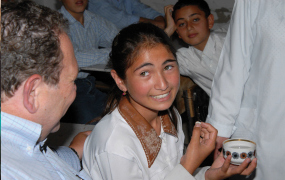 The deworming program in Azerbaijan concluded in 2013, having successfully dewormed nearly 800,000 school children throughout the country and provided hygiene education to prevent reinfection. Additionally, RVF carried out capacity building by training to lab technician and parasitologists in modern, Kato-Katz method in intestinal helminth survey and diagnosis.
The deworming program in Azerbaijan concluded in 2013, having successfully dewormed nearly 800,000 school children throughout the country and provided hygiene education to prevent reinfection. Additionally, RVF carried out capacity building by training to lab technician and parasitologists in modern, Kato-Katz method in intestinal helminth survey and diagnosis.
Background
Worms (intestinal parasites) cause children to suffer from:
- reduced growth rates
- learning problems & poor school attendance
- malnutrition
- anemia
Program included:
- Lab-based assessment of worm burden in children pre- and post-treatment
- 2 doses of mebendazole at 6 month intervals
- Training in personal hygiene for children, families, and teachers, including provision of hand-washing supplies, to reduce rate of re-infection among schoolchildren
Success of Pilot Program
- In 2006-2007 RVF partnered with the World Food Programme (WFP) and Azerbaijani Ministry of Health (MOH) in a pilot program targeting 16,000 school children and reducing the rate of infestation from 31% to 3%
- Baseline studies showed over 30% of children harbored one of three worms: Pin worms (enterobiasis), round worms (ascariasis) or the whipworm (trichuris trichiura)
- Treatment with 2 doses of mebendazole at 6 month intervals and raising of awareness among children, families, teachers, and medical staff reduced the worm burden to less than 3%.
National Initiative
The deworming campaign was successfully scaled up from the pilot program to a nation-wide deworming program:
- 2007-2008 – approximately 150,000 school-aged children in 17 districts were dewormed
- 2008-2009 – an additional 120,000 school-aged children in 29 districts were dewormed
- 2010-2011 – an additional 200,000 school-aged children in 41 districts were dewormed
- 2012-2013 – an additional 320,000 school-aged children were dewormed in every district of the country
Sustainability
- Azerbaijani health care workers responsible for implementing program
- MOH assumed 100% financial responsibility for program in 2013